
|
 Regional Publishable Reports
| |
Institutional framework and decision-making practices for water management in Cyprus
Towards the development of a strategy for aquifer protection and management in Pegeia, Paphos
|
|
|

Download (7.79MB)
|
Summary
This volume of the INECO publishable reports outlines the analysis of the institutional framework and decision-making practices for water management in Cyprus. It highlights the main water management challenges faced in the country today, and focuses on a water management issue of primary importance, groundwater overexploitation. Responding to this challenge, the INECO project implemented a participatory approach for achieving consensus on water management options for the management of the coastal aquifer of Pegeia. The aquifer, located west of Paphos town, is used for drinking and irrigation water supply. Although not yet subject to dramatic sea water intrusion, the aquifer is becoming increasingly vulnerable due to the rapidly increasing residential and tourism demand and the lack of infrastructure for sewage collection and treatment. The outcomes of this process, which are summarized in the second part of this volume, can provide insight on how citizen involvement in water management decisions can facilitate the protection of vulnerable water bodies.
Contact Details: Dr. Ioannis Glekas, e-mail: iglekas@aeoliki.com, Aeoliki Ltd., 41, Themistokli Dervi str., CY-1066, Nicosia, Cyprus
|
|
| |
| |
Institutional framework and decision-making practices for water management in Tunisia
Towards the development of a strategy for improved groundwater management
|
|
|
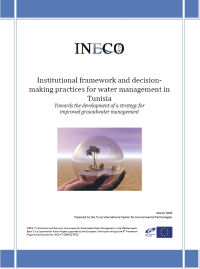
Download (3.4MB)
|
Summary
This volume outlines the analysis of the institutional framework and decision-making practices for water management in Tunisia, focusing on groundwater overexploitation issues. The preservation of groundwater resources, which are currently degraded after many years of overexploitation, is strongly linked to agricultural water use, as groundwater is a major water supply source in irrigated agriculture. Furthermore, the wider use of alternative water supply sources, such as treated wastewater for crop irrigation, has become one of the main priorities of the National Water Policy, in an effort to conserve freshwater resources and re-allocate these to other water use sectors. The second part of the volume describes the outcomes of the INECO Tunisia Case Study, which elaborated on alternative institutional and economic instruments for better managing groundwater resources through a participatory approach. Emphasis was placed on discussing recommendations for an enabling institutional environment towards the collective management of groundwater at the user level.
Contact Details: Mr. Foued El Ayni, e-mail: unite-chg@citet.nat.tn, Tunis International Center for Environmental Technologies, Boulevard de l'Environnement, 1080, Tunis, Tunisia
|
|
| |
| |
Institutional framework and decision-making practices for water management in Egypt
Towards the development of a strategy for water pollution prevention and control in the Bahr Basandeila region
|
|
|
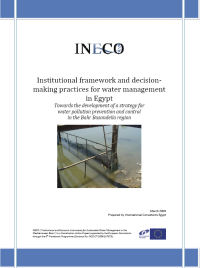
Download (6.0MB)
|
Summary
The first part of the report outlines the analysis of the institutional framework and decision-making practices for water management in Egypt. It highlights the main water management challenges faced in the country today, and focuses on significant water management issues pertaining to the “sharing”, “valuing” and “governing” dimensions of water resources management. The second part of the report presents the results of the INECO Egypt Case Study on water quality deterioration in the Bahr Basandeila Region. The Basandeila Region is located in the Dakahlia Governorate; currently, the area faces serious problems affecting mostly the quality of drinking water supply and having impact on population health. Water pollution is primarily due to the discharge of industrial and municipal effluents without prior treatment. The problem is similar (in terms of causes and impact) to the overall water quality problems experienced in the River Nile and its distribution network. In this area, the INECO effort was primarily aimed at fostering discussions among citizens, stakeholders and local water management authorities, in order to identify deficiencies and suggest instruments that could assist in addressing the issues at hand.
Contact Details: Prof. M. Abou Rayan, e-mail: mrayan@usa.com, International Consultants Egypt, 91, Omar Lotfi str., 21321, Alexandria, Egypt
|
|
| |
| |
Institutional framework and decision-making practices for water management in the Damour River Basin, Lebanon
Towards the development of a strategy for water stress mitigation
|
|
|

Download (9MB)
|
Summary
The first part of the report entails an analysis of the institutional framework and decision-making practices for water management in Lebanon and in the Damour River Basin, located 20 km to the south of Beirut. Currently the area is facing a considerable decrease in the total amount of surface and groundwater of adequate quality available to meet the local domestic, irrigation and industrial demands. The problem becomes particularly acute in the downstream irrigated coastal plains of the basin, where farmers complain about the lack of water during the peak summer period. Groundwater resources are also under stress, due to the increasing volumes of water extracted to meet demands inside and outside the River Basin. In this context, the second part of the report concerns the presentation of the outcomes of the participatory approach implemented by INECO for developing options suitable for water stress mitigation and towards deriving policy recommendations towards the use of more equitable and efficient instruments towards sustainable water management.
Contact Details: Mr. C. Tabbal, e-mail: condev@condev-lb.com, Conseil et Developpement s.a.l. Brazilia - Sacre Coeur Hospital Str., Baabda, Lebanon
|
|
| |
| |
Institutional framework and decision-making practices for water management in Syria
Towards the development of a strategy for water pollution prevention and control in the Barada River Basin, Greater Damascus area
|
|
|
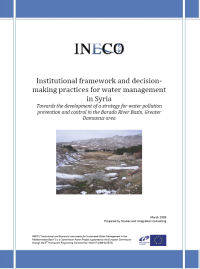
Download (6.2MB)
|
Summary
The first part of this report presents the analysis of the institutional framework and decision-making practices for water management in Syria. It further focuses on a water management issue that is currently perceived as extremely significant by water management authorities and citizens: the environmental degradation of the Barada River. Historically, the Barada River has been considered a vital socio-economic resource, sustaining the Ghouta oasis and agricultural activities in the area. The hyper-urbanisation of the greater Damascus area, coupled with the uncontrolled discharge of industrial effluents, has led to the significant degradation of the river and its tributaries, posing a significant threat for all local ecosystems, as well as surface and groundwater bodies. In the above context, the second part outlines the processes, methods and outcomes of the corresponding INECO Case Study, aimed at exploring alternative water management options for water pollution prevention and control through a participatory approach. Emphasis is placed on responses incorporating the application of economic and regulatory instruments to provide appropriate incentives for the development of industrial wastewater treatment facilities, regulating the use of agrochemicals in rural areas, and on the financial and technical sustainability of water services.
Contact Details: Mr. M. Haddad, e-mail: info@s-i-consulting.com, Studies and Integration Consulting, Thawra str., Sarouja, 22648, Damascus, Syria
|
|
| |
| |
Institutional framework and decision-making practices for water management in Algeria
Towards the development of a strategy for water pollution prevention and control in the Seybouse River Basin
|
|
|
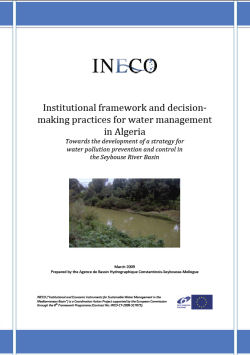
Download (6.47MB)
|
Summary
The first part of the publishable report presents an analysis of the institutional framework and decision-making practices for water management in Algeria. It outlines the main constraints faced in the water sector today and significant water management challenges that need to be addressed at the national level.
On the regional level, this report presents a water management issue that is of alarming importance: the degradation of water quality in the Seybouse River Basin. Along the Seybouse river and its tributaries, pollution originates mostly from the discharge of untreated domestic and industrial effluents; recent efforts undertaken by the State aim primarily on building infrastructure for sewage collection and treatment. However, it has become evident that the minimization of industrial pollution should be based on a policy that encourages and provides appropriate incentives and disincentives rather than on the traditional command-and-control approach. In this regard, the second part of the report presents the outcomes of the INECO Case Study in terms of identifying potential policy options and developing recommendations for addressing water quality degradation in the River Basin.
Contact Details: Mr. Khatim Kherraz, e-mail: kherraz@abhcsm.dz, Address: Agence de Bassin Hydrographique Constantinois-Seybousse-Mellegue (ABHCSM), 2, Rue Docteur Calmette 25000, Constantine, Algeria
|
|
| |
| |
Institutional framework and decision-making practices for water management in the Oum Er Rbia Basin, Morocco
Towards the development of a strategy for enhancing efficiency in irrigation water use
|
|
|
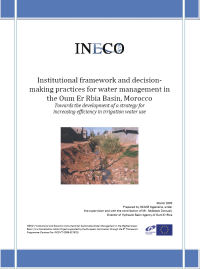
Download (6.0MB)
|
Summary
The Oum Er Rbia Hydraulic Basin, located in the mid-west part of Morocco is a River Basin of strategic importance for the country, which has already been the focus of important investments in hydraulic infrastructure. The Basin provides water to the strategic economic zone of Morocco, sustains important economic activities (industry and agriculture), and hosts a significant share of the country’s population. The volume presents the analysis of the institutional framework and decision-making practices for water management in the Oum Er Rbia Basin and in Morocco, and further introduces the main water management challenges faced in the region today. Subsequently, the second part presents the outcomes of the INECO Case Study, which was aimed at developing, through a participatory approach, a policy proposal on enhancing efficiency in irrigation water use, an important aspect of current policies towards demand management.
Contact Details: Dr. Abderrahmane Affia, e-mail: dg@iskane.ma, ISKANE Ingenierie, Centre commercial NADIA, Boulevard Roudani, Casablanca, Morocco
|
|
| |
|

|